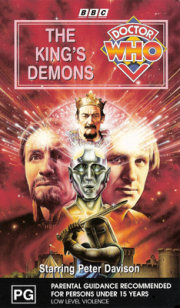The King's DemonsReviewed by Robert Boswell
The King's Demons belongs to that strange breed known as the two part story. Conventional fan wisdom has always suggested that these stories tend to be shallow and somewhat underdeveloped when compared to the longer stories. This has always been the reason why most fans oppose the idea of the series adopting a fifty minute complete story format like the Star Trek series use. Frankly, The King's Demons will never be used as an argument against this view. Terence Dudley's plot falls somewhere in the range of 'slight' to 'non-existent'. Very little of great significance seems to happen during the course of the story and it doesn't so much end as just stop. Which is not to say that it makes for unpleasant viewing - on the contrary, watching this story is a perfectly pleasant way to pass an hour or so - it's just that it has a some what inconsequential feel to it. The first episode builds up quite nicely, following the traditional 'pseudo-historical' formula: the Doctor and companions arrive in a (reasonably) accurately rendered historical setting, and slowly come to realise that something is a bit weird, leading up to the revelation of the alien presence at the end of the first episode. In this case, however, things go a bit pear-shaped once the alien - the Master - is revealed. The second episode is taken up largely by a lot of running about, getting captured, escaping, etc. It's a bit like the third episode of a four part story which is struggling to fill its length. And after all that activity, the Master's plot really seems tacked onto things in order to give some sort of vague justification for the villain's actions. What's more, his scheme is historically inaccurate and more than a little bit silly. In fact, it's no exaggeration to say that, in terms of using his character, The King's Demons is the nadir of Anthony Ainley's tenure as the Master (yes, even worse than Mark of the Rani!). This isn't helped by Ainley's performance: it's hard to say whether he is worse as French knight Sir Gilles (who occasionally appears to have a Pakistani accent), or as the literally lip-smackingly villainous Master. No, I tell a lie: Sir Gilles is definitely worse. Of course, the justification for the story is the introduction of new 'companion' Kamelion: there is little in the way of plot because it is merely a vehicle to introduce the android. But given Kamelion's non-appearance in subsequent stories, this isn't much of an excuse; and, anyway, Kamelion isn't as impressive as he's cracked up to be. I can remember being very impressed by him as a kid, but seeing him again now I just feel disappointment. I mean, sure it's an impressive piece of machinery (especially for 1983), but its lack of movement renders it useless for an adventure show like Doctor Who. Plus it's got lousy timing, delivering lines after too long a pause. Five minutes of Kamelion just leaves you nostalgic for Anthony Daniels in his gold suit. On the production side of things, the sets and costumes are of an excellent standard (unsurprisingly - we all know how much the Beeb love to handle historicals). Unusually for an Eighties story, the lighting is nicely subdued, allowing those flaming braziers to work to good effect. In the final analysis, The King's Demons is good looking and quite fun if you are in the right mood. But if you're looking for something substantial or challenging, look elsewhere. And if you're a Master fan, probably best to steer clear too. This item appeared in TSV 52 (November 1997). | |
